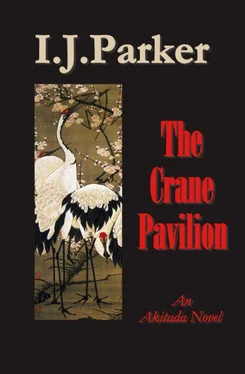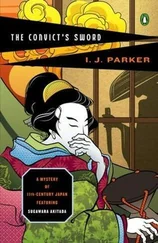I. Parker - The Crane Pavillion
Здесь есть возможность читать онлайн «I. Parker - The Crane Pavillion» весь текст электронной книги совершенно бесплатно (целиком полную версию без сокращений). В некоторых случаях можно слушать аудио, скачать через торрент в формате fb2 и присутствует краткое содержание. Жанр: Исторический детектив, на английском языке. Описание произведения, (предисловие) а так же отзывы посетителей доступны на портале библиотеки ЛибКат.
- Название:The Crane Pavillion
- Автор:
- Жанр:
- Год:неизвестен
- ISBN:нет данных
- Рейтинг книги:5 / 5. Голосов: 1
-
Избранное:Добавить в избранное
- Отзывы:
-
Ваша оценка:
- 100
- 1
- 2
- 3
- 4
- 5
The Crane Pavillion: краткое содержание, описание и аннотация
Предлагаем к чтению аннотацию, описание, краткое содержание или предисловие (зависит от того, что написал сам автор книги «The Crane Pavillion»). Если вы не нашли необходимую информацию о книге — напишите в комментариях, мы постараемся отыскать её.
The Crane Pavillion — читать онлайн бесплатно полную книгу (весь текст) целиком
Ниже представлен текст книги, разбитый по страницам. Система сохранения места последней прочитанной страницы, позволяет с удобством читать онлайн бесплатно книгу «The Crane Pavillion», без необходимости каждый раз заново искать на чём Вы остановились. Поставьте закладку, и сможете в любой момент перейти на страницу, на которой закончили чтение.
Интервал:
Закладка:
“Other people live there? In the Takashina mansion?”
“Yes. A nun, a student, and a retired professor. All absolutely respectable people who have fallen on very hard times. There’s also a caretaker and some artist, and Genshin has people from the city make repairs and trim the gardens.”
“How very odd! I recall the place. It used to be quite big, covering a whole city block on Tsuchimikado.”
“Yes, that’s it. Badly overgrown these days, but as I said, it’s kept in fairly decent shape. The main house is empty, since Genshin doesn’t use it, but some of the rooms in the wings and pavilions are occupied by the people I mentioned. Will you look into it?”
Akitada had been home for months now and had not left the house in all this time. He was aware of the fact that he was becoming a burden to his people who felt the need to hover protectively over him. Perhaps it was time to emerge from this self-imposed confinement and escape their supervision for a day. He nodded. “Don’t expect much. Only that I’ll visit the mansion and perhaps talk to the people who live there on Tasuku’s charity.” He shook his head at the notion of a charitable Tasuku. “It’s the oddest thing I’ve ever heard,” he muttered.
Nakatoshi smiled his relief and jumped up, thanking him profusely. The next moment he was gone.
Akitada also got up and stretched. He was wearing his old house robe and had torn slippers on his feet. The robe was badly worn and stained. He did not care about such things, but he could not go among strangers like this. He headed out of the house to find Tora.
When he reached the front veranda, he saw Nakatoshi and Tora in the courtyard below. They were in conversation, and Tora was grinning broadly. When they parted, Tora called after Nakatoshi, “I knew you could do it! Thank you, sir.” And then he did a little dance while Nakatoshi could be heard chuckling on his way out the gate.
Akitada waited until the gate had closed behind his visitor, then he called down to Tora, “Come in for a moment.”
Tora rearranged his face and bounded up the steps. “What a nice gentleman Secretary Nakatoshi is! I’m very glad you received him, sir.”
Akitada looked at him, decided to say nothing, and requested a change of clothes.
Formal attire, which was what was called for in this instance, was by no means easy to put on. And Akitada had not bothered with it for months now. Tora dug around in one of the trunks, the one for summer clothing, and brought forth white silk trousers and a short coat and robe of matching dark blue, figured silk. “Will this do, sir?”
Akitada looked at them. They were wrinkled. Tamako used to look after his wardrobe. “Hmm.” He reached for them.
“Maybe the women could do something about the wrinkles,” Tora said dubiously.
“No time,” muttered his master, stepping into the trousers and tying them at his waist. Tora held out the blue coat for him and then the outer robe. Reaching back into the trunk, he brought out a somewhat battered hat of stiffened black gauze, a pair of black slippers, and a blue sash. The sash he wound tightly around his master’s waist, folding over the ends in front. Akitada slipped on the shoes and tied the hat under his chin as Tora held up the big round silver mirror.
Tora stepped back, cocked his head critically, and remarked, “You’re getting as thin as a stork, sir. Shall I come with you?”
“If you keep your comments about my appearance to yourself,” Akitada snapped.
Tora grinned.
*
They went first to speak to Kobe. Their arrival brought the superintendent to his office door with a smile on his face. “Good work, Tora,” he said. “Come in, come in!”
Akitada looked from one to the other and shook his head. But he entered, sat down, and accepted a cup of wine. Tora hovered near the door.
Kobe was still grinning. “Let me guess. You’re here about the suicide of a Lady Ogata. Right?”
Akitada turned to give Tora another look. Tora studied the ceiling. Turning back to Kobe, Akitada said with a frown, “Was this just a conspiracy to get me out of the house, or is there really something wrong about her death?”
Kobe laughed but had the grace to look guilty. “There may be something odd about it. Mind you, it’s nothing we could prove, but I got the feeling the characters living in the good abbot’s house have their secrets. No doubt she did, too. As there was little we could do, it seemed just the thing for you to investigate.”
Akitada compressed his lips. “I’d hate to think someone died to give me a chance to exercise my mind. I do wish you wouldn’t meddle in my life.”
Kobe threw up his hands. “It wasn’t me. Well, not right away. Secretary Nakatoshi wrote to Lord Kosehira for his advice, and he suggested he talk to you.”
“The plot deepens. And you were to find a suitable murder for me?” Akitada paused. “But this is no murder, if I understand you correctly. The police have decided it’s a suicide. Surely you could have found something better.”
Kobe looked uncomfortable. “Well, let’s say there was no immediate suggestion of foul play in this instance. Look, if you insist on a clear-cut murder, I could use some help with several other cases. It’s not as if greed and violence aren’t alive and well in the capital.”
Akitada shook his head. “No, thanks,” he said a little bitterly. “Since you and my other friends have seen fit to interrupt my peace, I’ll take a look. But I had hoped that you could at least tell me there was something wrong about the suicide.”
“Well, there was no note. And the others seemed very surprised that she should do such a thing. But it looked very much like a suicide and the coroner concurred.”
“Tell me what you know about these ‘others’.”
Kobe thought. “There isn’t very much. They all live there by invitation. Since the abbot isn’t using his mansion and has no family to speak of, he has allowed certain people to take up residence there. Lady Ogata is said to have been a waiting woman to one of the emperor’s concubines. She was without family and very poor. There’s a retired university professor. I think he taught Chinese. His name is Suketada. He’s elderly. The youngest is a student, Takechi Akushiro. He is from one of the provinces and doesn’t seem to have much money. Or else, he squanders it on loose living. The last is a nun. She’s also old, but seems healthier than the professor. I know nothing about her background. Oh, and then there is the painter Yoshizane. He’s in his fifties and lives there because he supplies the abbot’s temple with his paintings.”
“What about servants?”
“No servants. Just a caretaker, a fairly shiftless character called Koshiro.”
“Thank you.” Akitada rose with a sigh. “I suppose I’ll take a look. Don’t expect anything, though.”
Kobe also got to his feet. “Akitada,” he said, “I’m truly sorry if we troubled you, but your friends care. The forty-eight days since your wife’s death are long past, and yet you still hide in your room. As for Lady Ogata, I have no proof that her death was not a suicide, but both Nakatoshi and Kosehira thought you would be interested since it happened to someone connected to Abbot Genshin. He was a friend of yours, I believe?”
Akitada nodded. “At one time. But back then, Takashina Tasuku was hardly the sort of young man I’d wish my own children to meet.”
Kobe’s eyebrows rose. “You don’t say? The good abbot is known as a most saintly person now. People change, you know.”
“Over the years, I’ve had reason to doubt that.” Akitada grimaced. “In any case, you and my other keepers have done well.”
4
The Takashina property slept in the autumn sun behind high walls and closed gates. Not a sound but the singing of birds came from inside. Here and there, curved, tiled roofs showed above the trees. The roofs and outer walls appeared in good repair, but the place was clearly half-abandoned. An estate of this size occupied by a noble family and its retainers would have attracted innumerable sheds and lean-tos against its sturdy walls, especially along the street where the main gate was. Poor people hoped to benefit from the traffic a wealthy and powerful household attracted and set up stands to sell food and other goods. Besides, some of the poorer servants often received permission to attach their humble homes to the estate’s walls.
Читать дальшеИнтервал:
Закладка:
Похожие книги на «The Crane Pavillion»
Представляем Вашему вниманию похожие книги на «The Crane Pavillion» списком для выбора. Мы отобрали схожую по названию и смыслу литературу в надежде предоставить читателям больше вариантов отыскать новые, интересные, ещё непрочитанные произведения.
Обсуждение, отзывы о книге «The Crane Pavillion» и просто собственные мнения читателей. Оставьте ваши комментарии, напишите, что Вы думаете о произведении, его смысле или главных героях. Укажите что конкретно понравилось, а что нет, и почему Вы так считаете.












